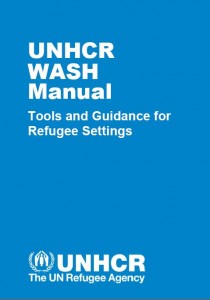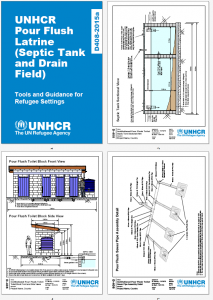
This document contains documentation to help UNHCR and WASH actors build pour flush institutional latrines in refugee settings with septic tanks and drain fields. The package includes: Technical Drawings; Step by Step Construction Drawings; Bills of Quantity; Material and Workmanship Specifications; and Design Calculations.
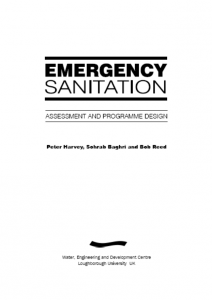
The book Emergency Sanitation: Assessment and programme design has been produced to assist those involved in planning and implementing emergency sanitation programmes. The main focus of the book is a systematic and structured approach to assessment and programme design. It provides a balance between the hardware (technical) and software (socio-cultural, institutional) aspects of sanitation programmes, and links short-term emergency response to long-term sustainability. The book is relevant to a wide range of emergency situations, including both natural and conflict-induced disasters, and open and closed settings. It is suitable for field technicians, engineers and hygiene promoters, as well as staff at agency headquarters.
Tags: Communal Toilets, Desludging and Excreta Transportation, Excreta / Urine ReUse, Excreta Composting, Excreta Management, Excreta Treatment, Household Toilets, Sewerage and Excreta Conveyance, WASH Assessments, WASH Monitoring, and WASH Programme Management. Languages: English. Organisations: WEDC. Categories: WASH Emergency Guidelines and WASH Reference Documents.
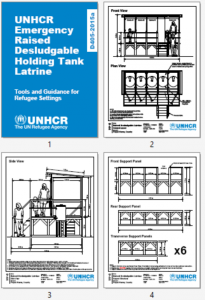
This document contains documentation to help UNHCR and WASH actors build emergency raised desludgable latrines in refugee settings. The package includes: Technical Drawings; Step by Step Construction Drawings; Bills of Quantity; Material and Workmanship Specifications; and Design Calculations.
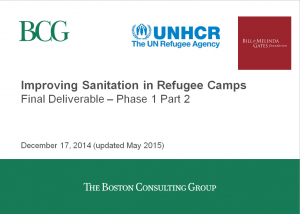
The report examines the feasibility of a wide range of standard sanitation technologies in addition to sanitation innovations in refugee contexts (including miniaturized biogas, reinvented toilets, new processor technologies, SMS dispatching, pay per use toilets, sale of by-products). Technologies were evaluated based on upfront investment cost; technology viability, suitable size and transportability; flexibility and resilience; and value for money.
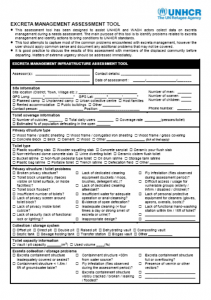
This assessment tool has been designed to assist UNHCR and WASH actors collect data on excreta management during a needs assessment. The main purpose of this tool is to identify problems related to excreta management and identify actions to bring conditions to UNHCR standards.
Tags: Communal Toilets, Desludging and Excreta Transportation, Excreta / Urine ReUse, Excreta Composting, Excreta Management, Excreta Treatment, Household Toilets, Sewerage and Excreta Conveyance, WASH Assessments, and WASH Monitoring. Languages: English. Organisations: UNHCR. Categories: WASH Blank Forms, WASH Emergency Guidelines, WASH Emergency Tools, and WASH Reference Documents.
 English
English






